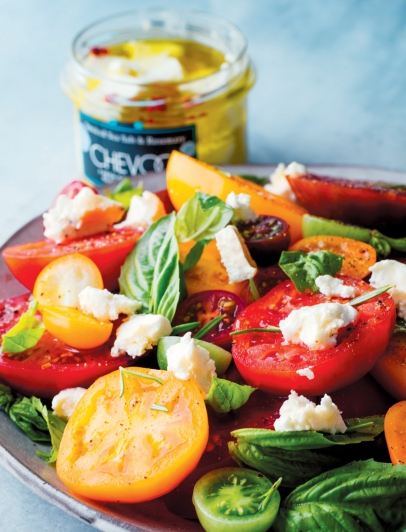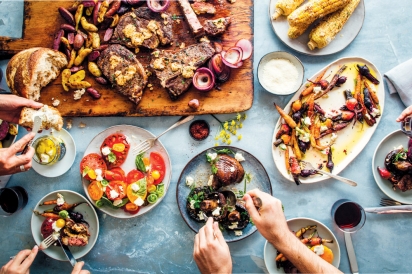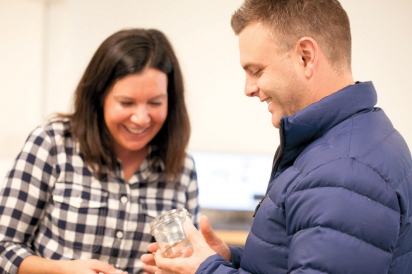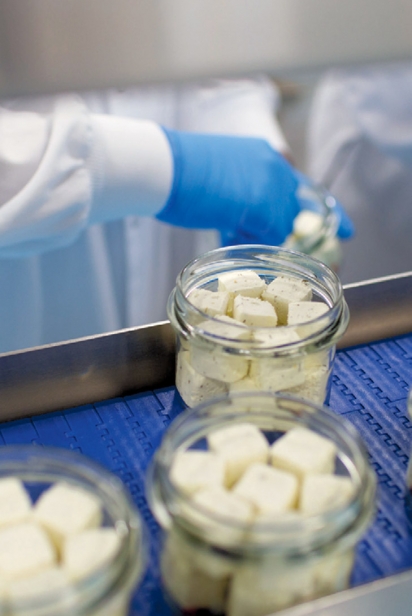Chevoo's Melting Pot
THE AUSTRALIAN TWIST ON A FRENCH CHEESE MADE IN CALIFORNIA
As many transplants to Northern California are well aware, a visit to this part of the world can be life changing. The iconic beauty of San Francisco! The fog and freezing summers! The amazing local foodshed! For Gerard and Susan Tuck, who founded the artisan goat cheese company CHEVOO in 2015, the siren song that is California beckoned for two seemingly wildly differing reasons: Stanford University and cheese.
Natives of Melbourne, Australia, the Tucks were not born into the business of cheese. Susan had a career as an educator in Melbourne. Gerard launched his career with KPMG Corporate Finance in mergers and acquisitions. At one of those life course pivot points that he says he did not even recognize at the time, Gerard found himself deeply immersed in advising a client on the sale of a cheese import and distribution business.
The client was Will Studd, then as now a renowned Australian expert on and tireless enthusiast for good cheese, and the business was Studd’s Calendar Cheese Company. Studd and Gerard worked closely throughout the sales process that endured, as these things do, for over half a year. Over the course of time, Gerard became very familiar with the business of cheese and, looking back from eight years distance, with cheese itself.
Shortly after the sale closed in 2009, the company’s new owners asked Gerard to run the business. They knew cheese, but they needed someone who understood the business side and could help them take the company to the proverbial “next level.” Gerard set about doing exactly that, working hard to build Calendar into a national distributor of world-class cheeses.
Two years in, in 2012, Gerard began to parse the Australian cheese market from a different perspective. Realizing that the largest category at Calendar was Australian-made marinated cheese, specifically goat cheese submerged in oil infused with herbs and spices, he sensed a market opportunity. Engaging in a bit of first-hand market research, he took a walk around the local markets near the Tucks’ home, where he found entire walls dedicated to locally made marinated cheeses. Hunch confirmed. As he tells it, he purchased more than 40 types of cheese that afternoon. His walk home, slowed by the weight of all those jars filled with cheese and oil, gave Gerard time to ponder what the global market might be for marinated cheese.
Further market research uncovered the fact that the U.S. cheese market was woefully lacking marinated cheese offerings. The potential of this business opportunity tickled the back of Gerard’s analytical brain for a bit as he went about running Calendar. Could he move to the U.S. and start a cheese business? he wondered.
“I was enjoying my work, but I was also considering this business opportunity, as well as pursuing advanced business studies,” he says. Palo Alto’s Stanford University, considered by many to be a pinnacle of higher education, seemed out of reach, yet he applied to the one-year Stanford MSx program for experienced business leaders and, lo and behold, was accepted.
The Tucks, by then a family of five including their three children— Bailey, now 9, Millie, 7, and Poppy, 4—landed in California in July 2013. Surrounded by some of the world’s most innovative technology companies, Gerard enrolled in the school of learning what it would take to build a new cheese business in California.
Stanford provided the first of many stepping stones to what would eventually become CHEVOO. There was also a bit of serendipity involved: “I was just starting my master’s program and Mattias Kunz, EVP of EMMI Americas, was doing a three-week executive program at Stanford,” Gerard says. They met for coffee. EMMI is the Swiss cheese giant that now owns Cypress Grove, Redwood Hill and Cowgirl Creamery. [Editor’s note: See the Summer 2017 issue of Edible Marin & Wine Country for more on the sale of these cheesemaking pioneers to EMMI.]
CHEVOO, the name a combination of Chèvre + Extra-Virgin Olive Oil (EVOO), like many even non-food start-ups, got its start in the kitchen. Gerard’s wife, Susan, did not have her own work visa at the time, so was not legally able to work in the U.S. During her “free” time (hard to come by with three kids under 6 years of age), she learned all she could about American cheesemakers, connected with olive oil producers, and experimented with different methods to infuse oil and cheese. By the time Gerard graduated Stanford in June 2014, the pair were ready to turn their business idea into a reality.
At the outset, the Tucks turned to the iconic home place of American cheese: Wisconsin. They undertook numerous rounds of R&D at the Wisconsin Center for Dairy Research, shipping in California-sourced olive oil. “It was the best system we could manage,” says Gerard, but as the family had decided to make their home in Northern California, it was far from their cheesemaking American dream.
Gerard put in a call to Kunz. “I told him I needed help,” he remembers. Kunz put the Tucks in touch with Cypress Grove’s general manager. “This was a huge step forward for us,” says Gerard. “We took this cobbled- together product to Cypress and asked for their help—and their goat curd.” With a long and continuing reputation of helping other cheesemakers get started, Cypress agreed to sell their goat curd to the Tucks.
Their next step was to find a place closer to the family’s new Northern California home to produce their cheeses. They initially found a production facility in southern Oregon, Rising Sun Farms. “People took a chance on us,” recalls Susan. “We had no credit history. We paid cash up front. We were living on our savings.”
Moving even closer to home, the Tucks began production in their own facility in Healdsburg in November of 2016. “We had been in business less than a year, but yet another business person, real estate investor Marc Brown, took a risk on us,” Susan says.
The Tucks, who now employ 16 people at their growing company, are mindful that luck plays a part in any immigrant’s story. “Countless people gave us a leg up,” says Gerard. They note especially one immigration officer’s tireless efforts to fix a visa irregularity while Gerard was studying at Stanford. Without that person going above and beyond, the whole thing could have gone “kaboom” before it even got off the ground, he says.
The Tucks currently live and work in the U.S. on visas that must be renewed every two years. Citing the amount of time and effort required to manage visas as an impediment to business growth, he shares “Planning business growth is not compatible with managing visas.”
We are grateful they are making the time to do both. Without the Tucks, our California cheese community would certainly be a little less rich.







